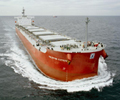Maersk eyes ‘leapfrog’ to carbon neutral fuels in shipping

The world’s largest shipping firm, Maersk, has called for urgent action to address the climate crisis, saying it will turn first to green methanol, and later to green ammonia in order to reach its goal of becoming carbon neutral by 2050.
The Danish shipping giant is looking at ways of cutting emissions this decade, saying the industry needs to act with a “crisis mindset” in order to respond to the climate emergency.
For Maersk, this means ditching transition fuels such as liquified natural gas (LNG), which are cleaner than the heavy oil traditionally used in large vessels but are still harmful to the environment because they are made from fossil gas.
“From our perspective as a company, we believe we have to leapfrog to carbon neutral fuels for our vessels and for transportation in general,” said Morten Bo Christiansen, head of decarbonisation at Maersk.
“Any talk about so-called transition fossil fuels is simply not relevant from our perspective, it’s simply not solving the problem,” he told an online press briefing last month. “The last thing we need is another cycle of fossil fuel assets,” he added, pointing out that ships built today have an average lifetime of about 20 to 30 years and will therefore still be around in 2050.
International shipping accounts for 2.2% of global carbon dioxide emissions, according to the International Maritime Organisation (IMO), more than aviation’s 2% share. The IMO, a United Nations agency, has said it aims to halve greenhouse gas emissions from 2008 levels by 2050.
Methanol: ‘The here and now’
Because of the urgency to cut emissions already this decade, Christiansen said the first solution Maersk can turn to is methanol, which he described as a mature technology. “And we see later also ammonia,” he added.
The problem is that methanol today is mostly made from coal or natural gas, which are both polluting, Christiansen continued. This is why Maersk is looking at green methanol made from biomass gasification, or so-called “Power-to-X” where biogenic CO2 is added to hydrogen. “And same with ammonia, made from hydrogen and then just adding nitrogen.”
A chemical traditionally used in the fertiliser industry, ammonia is now also entering the realm of energy as a way to store and transport hydrogen, or as an alternative transport fuel in its own right.
The hope is that these alternative shipping fuels will gradually become greener as biomass, ammonia and hydrogen are produced in growing quantities using sustainable production methods.
“But again, the ‘here and now’ perspective is that there is actually only one solution and that’s methanol,” Christiansen said, adding there are safety aspects to ammonia that need to be solved before it can be used on a commercial scale.
Maersk is seen as a trailblazer in the shipping industry when it comes to decarbonisation. On 2 June, the Danish firm called for a carbon tax on ship fuel to encourage the transition to cleaner alternatives. The Danish firm proposed a tax of at least $450 per tonne of fuel, which works out to $150 per tonne of carbon.
Maersk CEO Soren Skou called the tax proposal “a levy to bridge the gap between the fossil fuels consumed by vessels today and greener alternatives that are currently more expensive.”
Bottleneck
The main obstacle to green shipping fuels is scale. Production is still tiny and a massive increase in volume would be needed to decarbonise the shipping industry.
That requires quickly ramping up production of renewable electricity to produce green hydrogen “because that will very soon become the bottleneck here,” said Ulrik Stridbæk, head of regulatory affairs at Ørsted, the Danish energy firm.
“So we’re trying to match this with the electrons that will hopefully start to flow from the Baltic Sea,” said Stridbæk, who cited Danish government plans to build an “energy island” off Bornholm in the Baltic Sea to harness production of offshore wind to serve the Danish and German markets.
“This is the vision,” Stridbæk said. “Producing very large scale renewable electricity, and converting it” into green hydrogen and eFuels that can be used in the maritime and aviation sector.
Last year, Danish companies – including Ørsted, Scandinavian Airlines, and Maersk – launched the Green Fuels for Denmark initiative, with the aim of ramping up the production of renewable hydrogen in the country.
The first phase, targeted for 2023, would see the construction of a 10MW electrolyser to produce renewable hydrogen to be used as fuel for buses and trucks. By 2030, the capacity would reach 1.3GW, enough to supply the creation of more than 250,000 tonnes of sustainable fuel.
Renewable energy company Ørsted and Copenhagen Airport are amongst the consortium of businesses aiming to develop a hydrogen and sustainable transport fuel facility in the heart of the Danish capital. EURACTIV’s media partner edie.net reports.
Access to renewable electricity
“Clearly the constraining factor here will be the production of these fuels and the access to the renewable energy that is needed,” said Maersk’s Christiansen.
However, the cost of producing green fuels – whether methanol, ammonia, or hydrogen – is prohibitively expensive at the moment. And while demand is expected to boom in the coming years, eFuels are expected to remain more expensive than oil until the end of this decade, Christiansen said.
“A market based system, some kind of carbon price would surely level the playing field and incentivise investments into this. That is clearly something that would help and would be needed in the long term,” he said.
At EU level, the European Commission is preparing proposals to mandate a gradual incorporation of green jet fuel in aviation, with percentages increasing over the years. A certification scheme for renewable and low-carbon fuels is also under consideration as part of the revision of the EU’s renewable energy directive.
The proposal “will come with an updated set of incentives to promote the use of these fuels in various sectors,” the EU’s Energy Commissioner Kadri Simson announced in February.
The EU’s energy commissioner, Kadri Simson, has revealed details of upcoming fuel legislation, saying a certification scheme for renewable and low-carbon fuels and gases is on the horizon.
The EU executive is also preparing a green fuel law for shipping – FuelEU Maritime – which is due to be published on 14 July.
A draft of that law, seen by The Guardian, has opted for a goal-based approach that would set increasingly stringent “greenhouse gas intensity targets” to be met for the energy used on board.
The result is that LNG would be eligible to power EU ships until around 2040, a prospect environmental groups described as “a disaster.”
Source: EURACTIV

 Hellenic Shipping News Worldwide Hellenic Shipping News Worldwide, Online Daily Newspaper on Hellenic and International Shipping
Hellenic Shipping News Worldwide Hellenic Shipping News Worldwide, Online Daily Newspaper on Hellenic and International Shipping






















 PG-Software
PG-Software